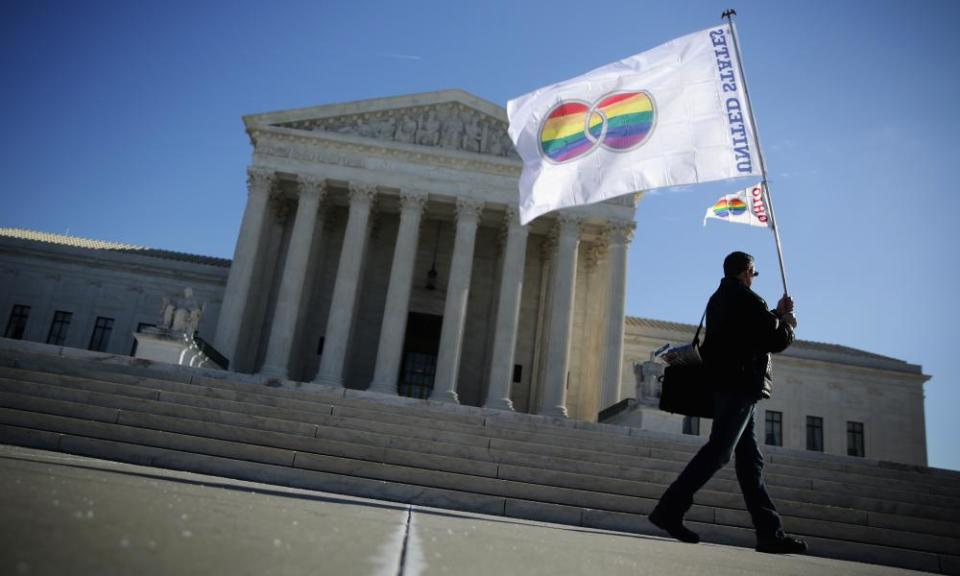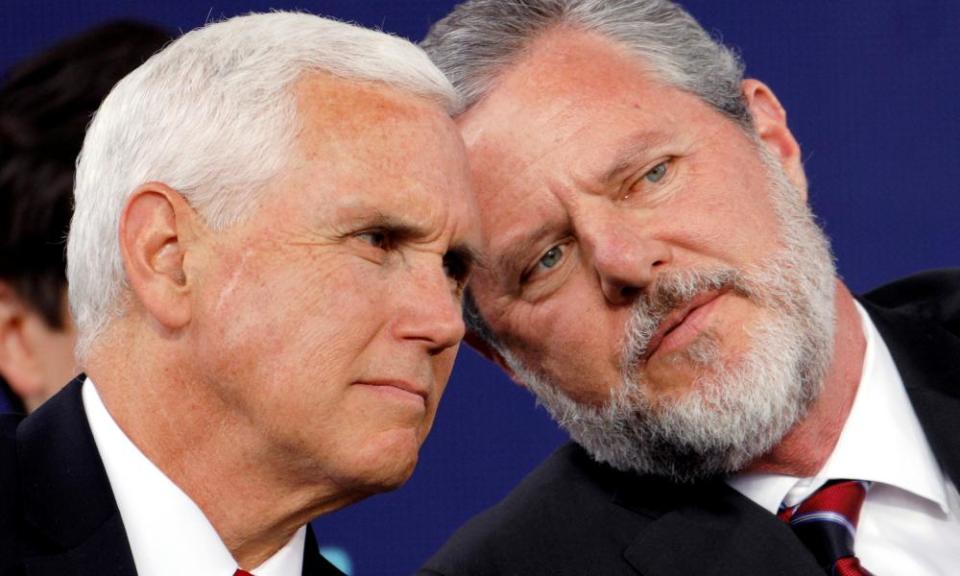Extreme abortion laws shine light on Trump's courting of religious right

After bowing his head in prayer, Donald Trump addressed faith leaders in the sunshine of the White House Rose Garden.
“Together, we are building a culture that cherishes the dignity and worth of human life,” he said, earlier this month. “Every child, born and unborn, is a sacred gift from God.”
It was hardly a detailed policy pronouncement – the president devoted more time to his bizarre claim that he has liberated shops to say “Merry Christmas” again. But it was enough to bring the audience to their feet, in rapturous applause, at the national day of prayer service. They sense a historic opportunity is theirs for the taking.
Related: Trump wants Barr to consider investigating Biden – Giuliani
Eight hundred miles away, Alabama is on the verge of turning back the clock to a near total ban on abortion. When some Republicans in the state Senate last week stripped an exception for rape and incest from the bill, shouting broke out in the chamber and the vote was postponed. If the measure passes it would give Alabama the harshest anti-abortion law in the country but it also points to a wider trend: Kentucky, Mississippi, Ohio and Georgia have approved bans on abortion once a fetal heartbeat is detected, which can occur in about the sixth week of pregnancy.
Alexandria Ocasio-Cortez, a Democratic congresswoman from New York with a huge social media following, tweeted in response: “‘6 weeks pregnant’ = 2 weeks late on your period. Most of the men writing these bills don’t know the first thing about a woman’s body outside of the things they want from it. It’s relatively common for a woman to have a late period + not be pregnant. So this is a backdoor ban.”
Hillary Clinton had no problem terminating a life in late term. Whoever was opposing her, I would have felt the same
Shannon Wilburn
The passage of such extreme laws has stunned reproductive rights advocates and thrown a fresh light on the marriage of convenience between Trump and an increasingly powerful religious right which was crucial to bringing to him power in 2016 and is intent on repeating the feat next year.
A thrice-married adulterer with previously socially liberal views, Trump captured four in five white evangelical voters, more than fellow Republicans Mitt Romney, John McCain or George W Bush in the previous three elections. Analysts suggest reasons include fear over a decline of Christian values, the failure of past Republican presidents to deliver their promises and Trump’s relentless focus on loading federal courts with conservative judges.
For Shannon Wilburn, a Christian and a teacher in Atlanta, the 2016 election came down to binary choice on abortion.
“The sanctity of life was a major deciding factor,” she said. “Hillary Clinton had no problem terminating a life in late term. Whoever the candidate was opposing her, I would have felt the same.”
Wilburn, 51, said she welcomes the recent moves at state level to curb abortion access.
“I take the stance of a pro-lifer. I’m a woman and people are talking about women’s rights, but what about babies’ rights?”
‘They feared the sixth vote’
While other Republicans presidents were ostensibly more religious, they were often seen as making too many compromises on the difficult issues. But Trump, in the eyes of evangelicals, has actually delivered, most obviously by nominating conservatives Neil Gorsuch and Brett Kavanaugh to the supreme court, potentially locking in their values for a generation and imperiling the 1973 Roe v Wade ruling that effectively legalised abortion.

Many Christian conservative voters dreaded a progressive majority on the supreme court.Photograph: Alex Wong/Getty Images
Henry Olsen, a senior fellow at the Ethics and Public Policy Center in Washington, said: “It’s purely transactional. Christian evangelicals had felt such a sudden reversal of fortune in America, they were afraid of what would happen to their faith under a progressive supreme court.”
Related: All the president’s judges: how Trump can flip courts at a record-setting pace
Evangelical pressure on Republican senate leader Mitch McConnell not to hold a vote on Barack Obama’s nominee for the court, Merrick Garland, “started long before Trump was the nominee”, Olsen said.
“They feared the sixth vote would be the death knell for central elements of their faith.”
McConnell’s ploy worked and the seat remained vacant going into the 2016 election. Trump, a vulgarian celebrity, was far from evangelicals’ first choice but soon became their champion. In return, they were willing to forgive his sins and believe in redemption, putting him on notice that personal misconduct in office would not be tolerated. Thus an unlikely relationship rooted in mutual dependency was formed.
Olsen, author of The Working Class Republican, added: “So you’ve got people afraid and a Republican nominee who seems to their bulwark. Trump, [turning] on a dime, says: ‘If that’s what it takes to get you, sign me up.’ He’s got the deal and they’ve got the deal and it’s plain sailing ever since.”
Trump, a Manhattan billionaire and reality TV star, infamously revealed his ignorance of the Bible in January 2016 when he referred to “two Corinthians“ instead of “Second Corinthians”. He spends more Sundays playing golf than going to church. But with born-again Christian Mike Pence at his side, he maintains enough outward shows of piety to keep the religious base satisfied.
Erick Erickson, a journalist and conservative evangelical, was fiercely opposed to Trump in 2016 but will vote for him next year.
“Some of my concerns about President Trump remain,” Erickson wrote recently. “I still struggle on the character issue and I understand Christian friends who would rather sit it out than get involved. But I also recognize that we cannot have the Trump administration policies without President Trump and there is much to like.”
Trump’s appeal is not just to white guys threatened by the growth in immigration or threatened by the #MeToo movement
David Barker
The character issue is a paradox many have found a way to rationalise. Some admirers argue that Trump has seen the error of his ways and found God. Others have drawn parallels with biblical figures such as King David or King Cyrus, deeply flawed men who nevertheless carried out God’s will.
David Barker, director of the Center for Congressional and Presidential Studies at American University, suggests Christian evangelicals start with an assumption of “human depravity” that sets expectations low, so Trump’s lying and philandering and Twitter rage and can be overlooked.
Speaking at the American Enterprise Institute (AEI) in Washington, Barker also noted the parallel between Christian nationalism and white nationalism over Trump’s 2016 election slogan, “Make America Great Again”.
He said: “While it is certainly true, and people have pointed out, that phrase is a nativist dog whistle … it’s also like a straight out statement to evangelical Christians that, ‘Hey, the United States has always been great, was great, the reason it’s great is because of its connection to God.’”
Barker also highlighted questions of belonging and identity.
“Republicans in general,” he said, “and certainly ‘red’ American conservatives in certain parts of the country, do have a sense that the elite culture on the coasts is abandoning them, has abandoned them, looks down on them. So they feel threatened, they feel attacked, they do feel discriminated against and persecuted.
“Trump’s appeal is not just to white guys who are threatened by the growth in immigration or threatened by the #MeToo movement. It also speaks to these evangelicals who feel like, ‘Yeah, we used to have a place in American society and we don’t feel like we have that place any more. When we turn on the TV, we can’t watch the Academy awards without having somebody look down at us or make fun of us.’”
This might explain why evangelicals apparently feel kinship with Trump when he claims persecution by the “fake news” media or investigators digging into his tax returns or contacts with Russia. However, there may also be some simpler, cruder areas of overlapping interest.

Jerry Falwell Jr confers with Mike Pence at Liberty University’s commencement ceremony in Lynchburg, Virginia on Saturday.Photograph: Jonathan Drake/Reuters
One of Trump’s most prominent evangelical supporters is Jerry Falwell Jr, president of Liberty University, one of the world’s biggest Christian colleges. Last week Reuters reported that according to a taped conversation, Trump’s longtime lawyer and fixer Michael Cohen intervened in 2016 to ensure that racy “personal” photographs of Falwell were destroyed. Falwell, who months later endorsed Trump for president, declined to comment to Reuters.
Last year, Falwell declared there was nothing that Trump could do that would endanger his support from evangelical leaders. Last week, referring to the Russia investigation, he tweeted: “Trump should have 2 yrs added to his 1st term as pay back for time stolen by this corrupt failed coup.”
‘Don’t all Republicans go to church?’
Recent research, however, suggests that the alliance is more fragile than widely assumed. Only 55% white evangelical Protestants said they prefer to see Trump as the Republican nominee in the 2020 when given other options, such as Pence or any other Republican, according to a survey by Morning Consult.
This is 16% fewer than the share of self-identified Republicans who said the same, and significantly lower than the 80% of white evangelicals who voted for Trump in 2016. The president’s approval rating among white evangelicals is 70%, 14 points lower than with Republicans in general. He must balance the other elements of his coalition.
Related: ‘You don’t have to date him’: the women standing by Trump in 2020
Emily Ekins, a researcher at the Cato Institute, told the audience at the AEI: “Trump drew disproportionate support from those voters who don’t go to church very often, which is really interesting. I think a lot of people think, ‘Well, don’t all Republicans go to church? Isn’t that what Republicans are?’ Well no, actually about half of Republicans say they never or very rarely ever attend religious services.”
Christians in America are far from a monolith. Many accuse Trump and Pence of hypocrisy and of hijacking faith for use in the “culture wars” over abortion, gay marriage and other issues. There are black churches in major cities, for example, that find no hint of “Make America Great Again” in their reading of the Bible.
The Rev Dr William Barber, a pastor in North Carolina and co-chair of the Poor People’s Campaign: A National Call for Moral Revival, said: “Any god with a small ‘g’ may be directing Donald Trump: the god of money, the god of greed, the god of racism. But he cannot claim to be a Christian and that God is directing him to be racist, to be Islamophobe, to hurt the poor and to take from the working people and poor people and give to the extreme wealthy and greedy who don’t need it, and to lie and lie and lie.
“All you’ve got to do is read Jesus’s first sermon where Jesus declared what it looks like when God is leading your life. When God is leading you, will preach good news to the poor, you will develop good policies for the poor, you will heal the brokenhearted, you will free people who are captive in society, you will embrace the unwelcome and the unwanted.”

